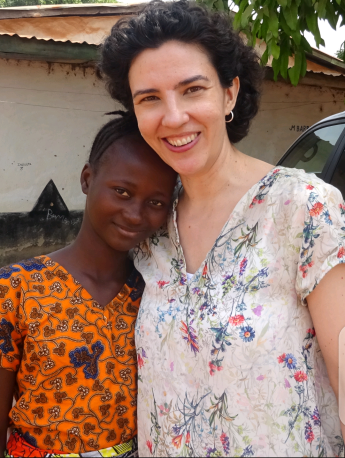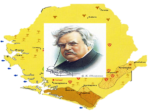
Figure 1 (above): Mariama Barrie, displaying her supplies for another year in school
Sixty-five (65) female headed households were supported by Manos Unidas with various livelihood activities (seeds for vegetable farming, petty trading, purchase of a pair of ruminants-goats, sheep and chickens) in 2018-19 as a strategy to help these families send at least one girl-child to school being SLCC’s contribution to long-term empowerment of women and girls in artisanal small-scale mining (ASM) communities. The girls, ages 3-18, were dubbed as ‘protagonist children’ given that they were the focus of the combined support provided by both their families and the SLCC. Without this support, the sixty-five would have never had the opportunity to access formal education or admittance to the local community schools. At the end of their first year in school, we were happy to report that all the 65-protagonist girls retained their places in school (no one dropped out) and analysis of school records indicated that only 8 out of the 65 girls repeated their classes. This was a great success rate compared to the dismal national failure rate in which over 90% of students who took the WASSCE exams in Sierra Leone failed (Sierra Network Report, 2019).
This success, according to an independent evaluation was attributed due to the accompaniment support provided by the SLCC staff and volunteers who utilized participatory awareness raising activities (Life Skills/Windows of Hope methodologies) to help girls and their families deal with the poverty challenges they face in their ASM communities. The provision of basic quality school supplies: a pair of uniform, books, a pair of shoes and a backpack per child and direct support to their families-was all that was needed to send 65 girls to school and ensure their retention in schools. Despite the challenges and grinding poverty faced by these children and their families including long stays at home caused by COVID-19, 10 out of the 65 girls continue to perform remarkably. One of these girls, Mariama Barrie (now age 13, figure 1), continue to top her class and is now in Junior Secondary school (JSS). She maintains her dream to ‘’…work hard and become a nurse so that one day, she will come back to her village and help address the health challenges of her community’’. So is also the story and aspirations of young Mariama Forewah (age 16, Figure 2), who is also topping her Class and about to go to Senior Secondary School (SSS1). She too, upholds her dream of studying Financial Accounting and Economics so that one day, ‘’I will become a banker’’.

Figure 2 (above): Mariama Forewah & Marta during a monitoring visit in Bongema


